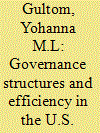| Srl | Item |
| 1 |
ID:
094306


|
|
|
|
|
| Publication |
2010.
|
| Summary/Abstract |
Choosing a desired policy for divestiture of dominant firms' generation assets has been a challenging task and open question for regulatory authority. To deal with this problem, in this paper, an analytical method and agent-based computational economics (ACE) approach are used for ex-ante analysis of divestiture policy in reducing market power. The analytical method is applied to solve a designed concentration boundary problem, even for situations where the cost data of generators are unknown. The concentration boundary problem is the problem of minimizing or maximizing market concentration subject to operation constraints of the electricity market. It is proved here that the market concentration corresponding to operation condition is certainly viable in an interval calculated by the analytical method. For situations where the cost function of generators is available, the ACE is used to model the electricity market. In ACE, each power producer's profit-maximization problem is solved by the computational approach of Q-learning. The power producer using the Q-learning method learns from past experiences to implicitly identify the market power, and find desired response in competing with the rivals. Both methods are applied in a multi-area power system and effects of different divestiture policies on market behavior are analyzed.
|
|
|
|
|
|
|
|
|
|
|
|
|
|
|
|
| 2 |
ID:
166478


|
|
|
|
|
| Summary/Abstract |
In some U.S. states that have undergone electricity market restructuring and deregulation, investor-owned utilities (IOUs) were required to divest the majority of their generation assets in order to purchase power from merchant generators, independent power producers, and power marketers competing in the new wholesale market. This paper examines the effect of the governance structures used to purchase power in the wholesale market, the bilateral forward contracts and market transactions, on the technical efficiency of IOUs during the post-divestiture period. Using a two-stage empirical strategy (the non-parametric data envelopment analysis and the difference-in-differences regression approach), I analyze the performance of 152 distribution utilities in the U.S. from 1994 to 2015. The results show that while the use of contracts has no significant effect, the use of market transactions has a significant negative effect on IOU technical efficiency. Trading arrangements in the restructured wholesale markets that rely on the concept of competition generate transaction costs that make it more costly for the utility to use market transactions rather than other alternatives. Thus, market transactions fall short to promote the efficiency purpose of IOUs as an economic organization in this policy-induced market and the adverse effect persists until 20 years after the divestiture.
|
|
|
|
|
|
|
|
|
|
|
|
|
|
|
|